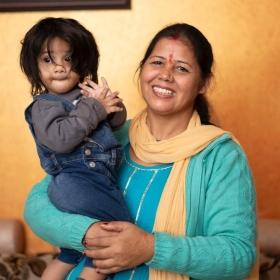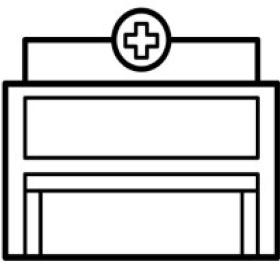Date last reviewed:
Tuesday, Jun 18, 2024
Information
Immunization concerns
Please discuss your immunization concerns with your child’s doctor or a public health nurse, community health nurse, or primary care nurse.
What's important to know
If you choose not to immunize your child, it's important that you understand the risks. Here's what you need to know:
- Vaccine-preventable diseases can be serious and even deadly.
-
Vaccines prevent diseases that can cause serious illness, long-term disability, and even death. For example:
- Pertussis can cause pneumonia, seizures, brain damage, and death.
- Meningococcal infection can cause meningitis (an infection of the lining that covers the brain) and septicemia (an infection of the blood).
- Mumps can cause permanent deafness.
- Measles can cause swelling of the brain, which can lead to brain damage and death.
- Polio can cause paralysis.
Many of these diseases have no treatment or cure, and vaccines are the only protection. - Vaccine-preventable diseases have not gone away.
-
Some parents choose not to immunize their children because they believe vaccine-preventable diseases are no longer around. However, some of these diseases, such as pertussis (whooping cough) and mumps, still occur in small numbers in Canada. Others, such as measles and polio, are common in other countries and are only a plane ride away. Without protection from vaccines, these diseases would spread quickly here, and outbreaks could occur.
- You can't always avoid vaccine-preventable diseases.
-
Any child can be exposed to vaccine-preventable diseases. Even if you avoid contact with people who are ill, you may not be able to prevent your child from coming in contact with a vaccine-preventable disease. Some examples:
- An unimmunized child can get measles by simply breathing the air in a room where someone with measles has been.
- Tetanus bacteria are found in dirt, dust, and soil. Any unimmunized child is at risk for tetanus.
- People can have a vaccine-preventable disease and have no symptoms but still infect others.
- Community immunity does not guarantee protection for an unimmunized child.
-
Some parents who decide not to immunize may believe that community immunity (herd immunity) will protect their child. However, community immunity does not guarantee protection for an unimmunized child. Your child will not be protected through community immunity if you live in an area with low immunization rates. Further, community immunity does not protect against all vaccine-preventable diseases (for example, tetanus).
- Unimmunized children are more likely to get a vaccine-preventable disease than immunized children.
-
Unimmunized children have a much greater chance of getting a vaccine-preventable disease than children who have been immunized. This is the case even in countries with high immunization rates. An example: In 2014, the Fraser Valley experienced the largest measles outbreak in BC in almost 30 years. It was thought to be caused by a traveller from the Netherlands, where a measles outbreak was occurring. Low immunization rates in one community allowed measles to spread quickly, resulting in over 400 cases.
- Not immunizing your child can put your family and others at risk.
-
When you choose not to immunize your child, you put not only your child at risk but also your family and others, including:
- Newborn babies who are too young to get immunized.
- People with weakened immune systems (for example, those receiving treatment for cancer).
- People with chronic health conditions.
Communities depend on high immunization rates to keep vaccine-preventable diseases from spreading. The more people who are immunized, the lower the risk for everyone. - If you refuse vaccines for your child, you may be contacted and offered the vaccines again.
-
If you refuse vaccines for your child, you may be contacted and offered the vaccines again. Vaccine refusal will be noted in your child's chart. However, your doctor may contact you to offer refused vaccines again. You may also receive a phone call or mail from your local public health unit, community health centre, or primary care clinic reminding you that your child is due for immunizations. This is because sometimes parents change their minds and may decide to immunize their children. Reasons for this may include:
- Changes in a child’s health.
- An increase in the risk of infection from a vaccine-preventable disease.
- Changes in beliefs.
- New information that a parent did not have before.
- Changes in vaccine recommendations.
When your doctor or a nurse contacts you, it is an opportunity to discuss any new information you may have or to ask questions.At a minimum, your doctor or a nurse may contact you to offer refused vaccines again at school entry and when your child is 10 and 13 years of age. You will also be contacted and offered vaccines for your child if they are unimmunized, and there is a vaccine-preventable disease outbreak at your child’s school. If there is an outbreak at your child’s school and your child is unprotected, your child may be asked to stay home until it is safe to return. They may miss several days or weeks of school. This is important to keep your child safe and to help prevent the outbreak from spreading.Mature minors are given the chance to consent to vaccines on their own, even if the parent has refused. Read about mature minor consent.
Your responsibilities as a parent of an unimmunized child
If you choose not to immunize your child, please follow these steps to protect your child, your family, and others.
- If your child visits a health care provider while ill
-
- Tell the medical staff that your child is not immunized. If your child has received some vaccines, let the medical staff know which ones.
- When your child is being evaluated, the doctor will need to consider the possibility that your child has a vaccine-preventable disease, which may affect what tests they do.
- If your child may have a vaccine-preventable disease, precautions can be taken (such as isolating your child) so that the disease does not spread to others.
- If there is a vaccine-preventable disease in your community
-
- Consider getting your child immunized. Getting immunized when an outbreak is already happening is better than never. Talk to your child’s doctor or contact your local public health unit, community health centre, or primary care clinic.
- Your child may be asked to stay home from school, childcare, or organized activities, such as sports and playgroups, until it is safe to return. Be prepared to keep your child home for up to several weeks. This is to protect both your child and others.
- Learn about the disease and how it spreads. It may not be possible to avoid exposure.
- If your child is exposed to a vaccine-preventable disease
-
- If you know your child has been exposed to a vaccine-preventable disease and they are unimmunized, contact your child’s doctor or your local public health unit, community health centre, or primary care clinic for advice.
- Learn what symptoms to watch for and when to seek medical attention.
- Each disease is different, and the time between when your child might have been exposed to a disease and when they may get sick will vary. Your child’s doctor, public health nurse, community health nurse, or primary care nurse can tell you when your child is no longer at risk of developing the disease.
- Follow recommendations to separate your child from others.
- There may be medications for people who have been infected or exposed to certain vaccine-preventable diseases. Ask your health care provider.
- Ask your health care provider about other ways to protect your family members and anyone else who may come into contact with your child.
- You may get a call from your local health authority. Every health authority has a team that follows up on cases and contacts of certain diseases.
- Travelling with an unimmunized child
-
- Before travelling, learn about the disease risks in the country you are travelling to and the recommended vaccines. Many vaccine-preventable diseases that are rare in Canada, such as measles and polio, are still common in other countries.
- Consider having your child immunized before travelling.
- If your child gets sick while travelling, there may not be the same quality of medical care as at home.
- If your child develops a vaccine-preventable disease while travelling, they should not travel by plane, train, or bus until a doctor determines they are no longer contagious (able to spread the disease to others).
- In certain instances, public health authorities may prevent people with vaccine-preventable diseases from travelling, due to the risk of disease spreading.
Adapted from:
If You Choose Not to Vaccinate Your Child, Understand the Risks and Responsibilities (World Health Organization Regional Office for Europe).
When parents choose not to vaccinate: Risks and responsibilities (Canadian Paediatric Society)



